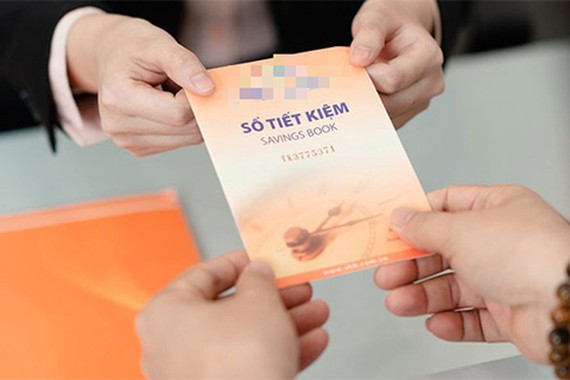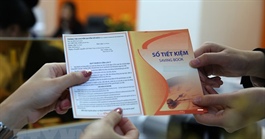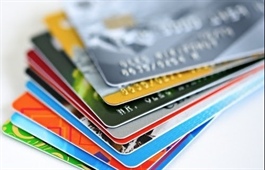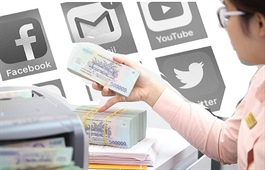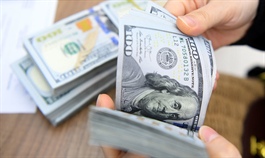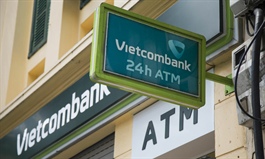Loan on savings account risky for banks
Loan on savings account risky for banks
Banks must crosscheck and verify all given information of a savings book or savings account holder before sanctioning a loan, so as to avoid any risk to the bank. Dr. NGUYEN TRI HIEU, a banking and financial expert, spoke with Saigon Investment to explain this issue further.
Illustrative photo.
|
JOURNALIST: - Sir, although the State Bank of Vietnam has warned of many risks to commercial banks when providing loans to savings depositors, this form of giving credit by banks has been quite common in the past. What is your opinion on it?
Dr. NGUYEN TRI HIEU: - We need to look closely at both banks and customers to see why this form of credit is still in use. Many people now have more money to put in their savings accounts at banks, but then they need cash for different reasons like making urgent payments or for investments. If they withdraw their money from their savings accounts, they can only get interest at demand deposit interest rate, which is quite low. Hence, many people choose to take out a mortgage on their savings at a higher interest rate than their savings interest rate, even though the mortgage is for a shorter term. As a result, customers benefit from this kind of transaction.
For banks, opening savings accounts for customers is part of their services. The customers may then take out mortgages on their savings accounts. Usually, a mortgage is lower than the total amount in the savings account. It could be 80% to 90% of the savings account, and the interest rate on the mortgage is about 2% to 3% higher than the savings interest rate. In theory, banks benefit from such transactions. Firstly, they keep the savings amount and just move the amount in the savings account to a mortgage account if the customer fails to pay off the mortgage. Secondly, the loan or mortgage interest rate is always higher than the savings interest rate. Thirdly, this is also a way for banks to promote credit growth.
In practice, however, there are several disadvantages. This kind of loan obviously increases the total assets of the bank, but such an increase is not real. It is just a technical increase rather than a real increase. For instance, if customer A puts in VND 100 bn in a savings account in a bank, the bank will use this amount for loans and other activities. If the bank gives customer B a VND 80 bn loan, after that, customer A takes out a VND 80 bn mortgage on his or her savings. The bank will then record VND 160 bn as its credit asset while its actual capital source is only VND 100 bn. This causes liquidity risks. This kind of loan increases the risk of creating unreal assets in the bank at the time of giving loans, and it could lead to rise in interest rates.
- Sir, you have just given an example of a loan agreement between two parties, but it may also include a third party and cause a dispute. A customer may put his or her savings in a bank and then take out a mortgage in another bank. How can we deal with this problem?
- Several countries have banned mortgages on savings. They call it “ghost credit”, which means unreal credit, and it is risky, and even badly affects the safety of the entire banking system. Once customer A opens a savings account at bank B, and takes out a mortgage on the savings in bank C, then in principle, in such a situation, there is a three party agreement signed by the customer. The three parties being, the savings keeping bank, the customer, and the bank giving the loan.
When customer A takes a loan from bank C, there must be an agreement approval from bank B, the keeper of the savings. In the worst case scenario, if customer A fails to pay off the loan, bank C has the right to ask bank B to get the money out from the savings account of the concerned customer to pay off the debt. If there is no such agreement between the banks, then the bank that is keeping the customer’s savings cannot pay the debt at the bank giving the loan because they are in an agreement. In such a case, the bank giving the loan does not verify the information about the customer, so such a savings account is not valid. It is also against the credit organization Law.
- Sir, in reality, some people have tried to use loopholes when taking out a mortgage. For example, a company did not meet the requirements for taking a loan from a bank and asks a person to open a savings account, and then uses the savings amount to take out a mortgage. This poses a real risk for banks. Regarding this, some people believe that it is high time that the State Bank of Vietnam acts on this matter. Do you agree with this idea?
- Not only have businesses made use of loopholes in the laws, but individual customers have withdrawn money from their savings accounts through mortgages, or a customer and a credit executive at a bank collude together to complete procedures for a false savings account in order to withdraw money from the bank. However, I do not think SBV should be involved too much in this matter because this is something among banks only and they should know how to cope with the problem. The State Bank of Vietnam should only manage macro-economic banking and leave other operations to commercial banks.
- Sir, in your opinion how can commercial bankss best tackle this issue?
- I suppose commercial banks in Vietnam should now establish an internal network for sharing information about their customers. For one thing, savings books may be no longer very common now. Customers may open an online savings account. Whether customers have savings books or online savings accounts does not really matter. What is important is that such an internal information sharing network could provide credit executives at commercial banks with all the necessary information about customers who want to take out mortgages on savings. The credit executives would know who the customers really are and how risky a transaction it is. Then, they can decide whether to give a loan or not.
When the bank agrees to provide a loan, it will ask for approval from the bank holding the savings, and a three-party agreement can be signed between the bank with the savings account, the customer and the loan providing bank. The three-party agreement will clearly stipulate the roles, interests and obligations of each party, making it easy to settle a dispute if it ever arises.
- Thank you very much.


